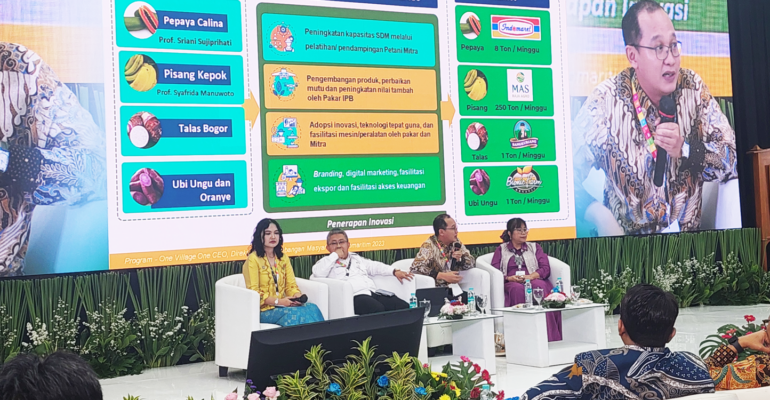Supporting the Achievement of SDGs in Indonesia, IPB University Introduces OVOC at SDGs Centre Conference 2024

IPB University through the Directorate of Agromaritime Community Development (DPMA) introduced the innovation “One Village One CEO (OVOC)” at the SDGs Centre Conference 2024 held by the National Development Planning Agency (Bappenas) Republic of Indonesia. This forum brings together various stakeholders, including the government, academics, the private sector, and communities that have a focus on activities to improve the standard of living of the community based on the 2030 Sustainable Development Goals (SDGs).
The presence of IPB University through OVOC innovation is the main highlight, considering its relevance in supporting the achievement of SDGs targets, especially in poverty alleviation and improving the welfare of rural communities.
This One Village One CEO (OVOC) program aims to create a superior commodity-based business ecosystem in villages. In its application, each village is expected to have a CEO who is responsible for managing and developing local potential professionally.
Directorate of Agromaritime Community Development (DPMA) of IPB University, Dr Handian Purwawangsa explained, this initiative not only utilises science and innovation that comes from the academic environment, but also empowers the local community to be the main driver in the economic development of their own village.
“Thus, OVOC becomes a clear example of how science and innovation can be applied directly to improve the welfare of the community in a sustainable manner,” he said.
The One Village One CEO (OVOC) program consists of three main stages, namely One Village One Product, One Village One Innovation, and One Village One Exporter. The three stages are designed to enhance the independence and economic well-being of the village through local innovation and empowerment.
“Each village is identified with its potential to have one superior product that is distinctive and has the potential to be developed. Then, efforts are made to improve product quality through training and assistance. The goal is to produce products that are competitive in local and national markets,” he explained.
In the end, it will be focussed on expanding the village’s superior product market to national and international markets. These efforts are carried out through the process of innovation and quality improvement to meet global market standards and requirements.
According to Dr Handian, this SDGs Centre Conference 2024 is also an ideal forum to increase collaboration between various parties. With this meeting, it is hoped that a closer network of cooperation can be formed. This collaboration is very important to ensure that innovations such as OVOC can be implemented widely and effectively in various villages in Indonesia.
“This forum is also an opportunity for IPB University and other participants to share experiences, learn from best practises, and find joint solutions for the challenges faced in achieving SDGs,” he said.
The exposure to OVOC in this forum, he said, emphasised IPB University’s commitment in supporting sustainable development and improving the standard of living of rural communities.
“With the support and collaboration from various parties, the implementation of OVOC is expected to be expanded and become a model adopted by more villages, so that the welfare of the community can be improved evenly throughout Indonesia,” he said. (*/Rz) (IAAS/IAN)



